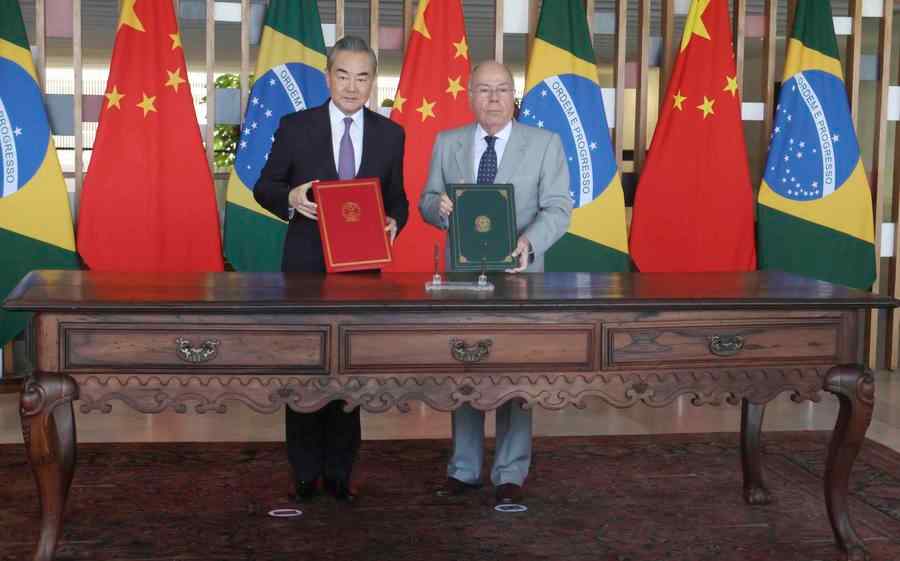Interview: Chinese collaboration boosts Brazil's EV industry, says business leader

Chinese Foreign Minister Wang Yi, also a member of the Political Bureau of the Communist Party of China Central Committee, and Brazilian Foreign Minister Mauro Vieira, sign an agreement on mutual visa facilitation to further expand personnel exchanges between the two countries in Brasilia, Brazil, Jan. 19, 2024. (Photo by Rahel Patrasso/Xinhua)
Chinese technology and investment in electric vehicles (EVs) will allow Brazil to take a leap toward decarbonization on the environmental agenda.
by Xinhua writer Zhou Yongsui
SAO PAULO, Feb. 1 (Xinhua) -- Through collaboration with Chinese companies, Brazil has gained access to cutting-edge technologies to promote its electric automotive industry, a Brazilian business leader has said.
Chinese technology and investment in electric vehicles (EVs) "will allow Brazil to take a leap toward decarbonization on the environmental agenda," Ricardo Bastos, president of the Brazilian Association of Electric Vehicles, told Xinhua in a recent interview.
Noting that Brazil is the largest economy and the biggest automotive market in South America and experiencing a boom in electric mobility, Bastos said EV sales surged by 90 percent in 2023 compared to the previous year, with a total of 94,000 new EVs sold.
"We also expect significant growth in 2024 of around 60 percent. We estimate that 150,000 units of automobiles and light commercial vehicles could be sold," he said, adding that this demand would be covered by the output of Chinese companies at Brazilian plants.
"The growth of sales in Brazil is impressive, and so is the leading position of Chinese companies," he said.
Lauding the leading role of Chinese companies in bringing new technologies to Brazil, Bastos said it allows the South American country to be a part of the global energy transformation.
It's not just the vehicles but also "the spare parts, the services, the entire chain linked to automotive production," he said, adding that there have been "significant cases here in Brazil of Chinese investment in electricity generation and energy transmission."
Through collaboration with Chinese companies, Brazil's progress in the EV industry is enhancing the nation's efforts for environmental sustainability.
Being home to 60 percent of the Amazon rainforest and an agricultural powerhouse, Brazil seeks to play a leading role in environmental matters and green development.
"Chinese automotive companies are providing Brazil the opportunity to do even more good things for the environment, to serve as an example to the world on environmental issues," he said.
- Interview: Trade protection measures against Chinese EVs would be a "serious mistake," says German economist
- GLOBALink | Indonesian ambassador to China hopes to strengthen cooperation in EV, green economy
- China's BYD adds new dealership in Tokyo
- Interview: China's industrial capacity eyes global market, says Thai banker
- Feature: Chinese EV brand eyes growth, integration in Hungary

